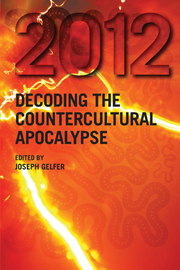Book contents
- Frontmatter
- Contents
- Contributors
- Preface
- 1 Introduction
- 2 The 2012 Phenomenon: New Uses for an Ancient Maya Calendar
- 3 Maya Prophecies, 2012 and the Problematic Nature of Truth
- 4 Mayanism Comes of (New) Age
- 5 The 2012 Milieu? Hybridity, Diversity and Stigmatised Knowledge
- 6 Chichén Itzá and Chicken Little: How Pseudosciences Embraced 2012
- 7 Roland Emmerich's 2012: A Simple Truth
- 8 The 2012 Movement, Visionary Arts and Psytrance Culture
- 9 In a Prophetic Voice: Australasia 2012
- 10 Approaching 2012: Modern Misconceptions versus Reconstructing Ancient Maya Perspectives
- Notes
- Index
5 - The 2012 Milieu? Hybridity, Diversity and Stigmatised Knowledge
- Frontmatter
- Contents
- Contributors
- Preface
- 1 Introduction
- 2 The 2012 Phenomenon: New Uses for an Ancient Maya Calendar
- 3 Maya Prophecies, 2012 and the Problematic Nature of Truth
- 4 Mayanism Comes of (New) Age
- 5 The 2012 Milieu? Hybridity, Diversity and Stigmatised Knowledge
- 6 Chichén Itzá and Chicken Little: How Pseudosciences Embraced 2012
- 7 Roland Emmerich's 2012: A Simple Truth
- 8 The 2012 Movement, Visionary Arts and Psytrance Culture
- 9 In a Prophetic Voice: Australasia 2012
- 10 Approaching 2012: Modern Misconceptions versus Reconstructing Ancient Maya Perspectives
- Notes
- Index
Summary
Although most commonly associated with Maya prophecies and astronomy (Argüelles 1996; Calleman 2001; Jenkins 1998, 2007; Lungold 2006; Pinchbeck 2006; Sitler 2006), belief and/or hope in an apocalypse, millennial occurrence, or major event of either destruction, rebirth, or spiritual enlightenment happening on 21 December 2012 is shared by a diverse collection of established theological groups (Everhart 2008; Helminski 2009) and other communities and subcultures. These include New Age spiritualities, UFO, Planet X/Nibiru, angelic, lost civilisations, and anti-government conspiracy enthusiasts (Arnold 2005; Horn 2007; Kaa and Raa 2006, 2007, 2008; Mau 2003, 2006; Rose 2006; Smith 2006). In addition to maintaining a common belief that something profound will occur on that particular solstice, these groups advocate and promote the legitimacy of stigmatised knowledge, which Michael Barkun has identified as “claims to truth that the claimants regard as verified despite the fact of the marginalization of those claims by the institutions that conventionally distinguish between knowledge and error—universities, communities of scientific researchers, and the like” (Barkun 2003: 26). He argues that it comprises:
• Forgotten knowledge: knowledge once allegedly known but lost through faulty memory, cataclysm, or some other interrupting factor (e.g., beliefs about ancient wisdom once possessed by inhabitants of Atlantis).
• Superseded knowledge: claims that once were authoritatively recognized as knowledge but lost that status because they came to be regarded as false, or less valid than other claims (e.g., astrology or alchemy).
- Type
- Chapter
- Information
- 2012Decoding the Countercultural Apocalypse, pp. 60 - 85Publisher: Acumen PublishingPrint publication year: 2012



